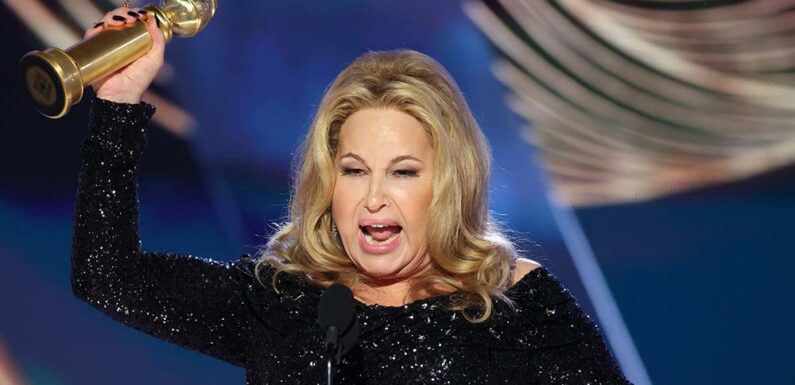
Jerrod Carmichael opened the Golden Globes by attempting to deconstruct the show before it began. Addressing the show’s absence for a year, after its presence on-air had paused amid scandals around a lack of racial inclusion in the Hollywood Foreign Press Association, among other issues, Carmichael, a Black comedian, described considering whether or not it was worth lending his name and reputation to the show’s comeback. Obviously, he had said yes, but was not averse to raking the show over the coals in explaining why (money, primarily — a half-million dollar paycheck, he said) or in elucidating what wrongs had been done in the past. Carmichael, acid-tongued as any Globes host in recent memory but a less-well-known quantity than any, evinced a clear-eyed sense of what is possible in Hollywood. “I took this job assuming they hadn’t changed at all,” he said. (The laughter felt muted. Hadn’t everyone in the audience — an incomplete but very robust complement of Hollywood stars — agreed to show up as well?)
It lies to others to determine the degree to which the Hollywood Foreign Press has changed meaningfully. But as to whether or not they were able to keep up a good face for their strange purgatorial year, back on NBC one more time before the contract expires but exiled to Tuesday night — well, they hadn’t changed much. Which was (really!) a good thing. The speeches were stem-winding and often strange, and the sense of occasion was alternatingly grave and buoyant in that perfect Globes way. There were good reasons for the Globes to have left the air, and there is much about their legacy to critique; this broadcast was also a reminder that there are, despite it all, reasons the Globes are still here.
I am a believer that awards shows are shaped by the speeches given — and by what the speakers are allowed to give. In this, the Globes were an unqualified success. Through the COVID era, we have seen various awards shows, notably the Emmys, radically constrain winners with play-off music while allowing endless useless bits to flourish. If you like actors speaking to camera, this awards show was all-killer, almost-no-filler — and it was, radically, allowed to come in almost 20 minutes over time even with several winners staying home. (Two key moments of delight late in the ceremony: When one presenter, Natasha Lyonne, cracked that the show had to come in by 11 at around 11:05 eastern time, and when another, Regina Hall, simply could not keep a straight face while reading Teleprompter language about absent winner Kevin Costner’s deep desire to be there.)
Carmichael’s presence grew warmer as the show progressed. He had no more significant bits after the monologue, but he was a presence on the stage, generally being so benignly encouraging of the stars he introduced that his hardest-hitting joke of the night — calling out Globes critic Tom Cruise for his ties to the alleged scandals of Scientology — caught in the throat. It was stunning not merely for its timing, just before two stars of “Top Gun: Maverick” took the stage to present awards, but for its angle of approach. Even Jerrod Carmichael, who had begun the broadcast talking about how venal and unworthy this show was, was willing to defend it once it got going.
It felt that way, at least, because there was a real pleasure to the old Hollywood machinery working itself back up again! This was probably the most “normal” awards show since COVID — the Emmys have not yet figured it out, and the Oscars that might have come closest were randomly derailed this year. (The less said about Eddie Murphy’s brief lifetime achievement awards speech at this Globes concluding on a Will Smith joke, perhaps, the better.)
Indeed, inasmuch as these Globes felt abnormal, after the top of the show, it was in the luxurious spread of the speeches. The decision to let various early speeches and presentations, including Jennifer Coolidge’s first appearance on the stage to uproariously narrate the process by which she became a presenter, seemed to earn their time. (Later in the broadcast, called back as a winner for “The White Lotus,” Coolidge thanked the Golden Globes for not playing her off as the Emmys had last year, before delivering a juicily moving tribute to show creator Mike White.) A person more intelligent or more tactical than I might be able to find points to edit out; in a world where we stipulate awards shows must come in as close to three hours as possible, that seems possible. But putting a threatening bed of piano music under various winners as a way to signal whose time was less valuable seemed like an imperfect option: In this case, no overlong speaker was dithering, wasting time, or listing names.
Indeed, the winners seemed committed to playing this show as a Globes-as-close-to-usual: Gratifyingly, “White Lotus” creator White even got benevolently tipsy, explaining in his speech for Best Limited Series that he’d missed the cutoff for dinner service and only was served Champagne. The HFPA’s sins are their own — and viewers can judge Carmichael’s monologue, in which he stated he refused to meet with organization head Helen Hoehne, against Hoehne’s own brief speech late in the broadcast. But as a vehicle for conveying spirited, jubilant, thoughtful, emotional awards-show-speech content? The Globes are back — or, at least, they were, for a night, one that ought to serve as good advertising for what lies ahead.
Read More About:
Source: Read Full Article